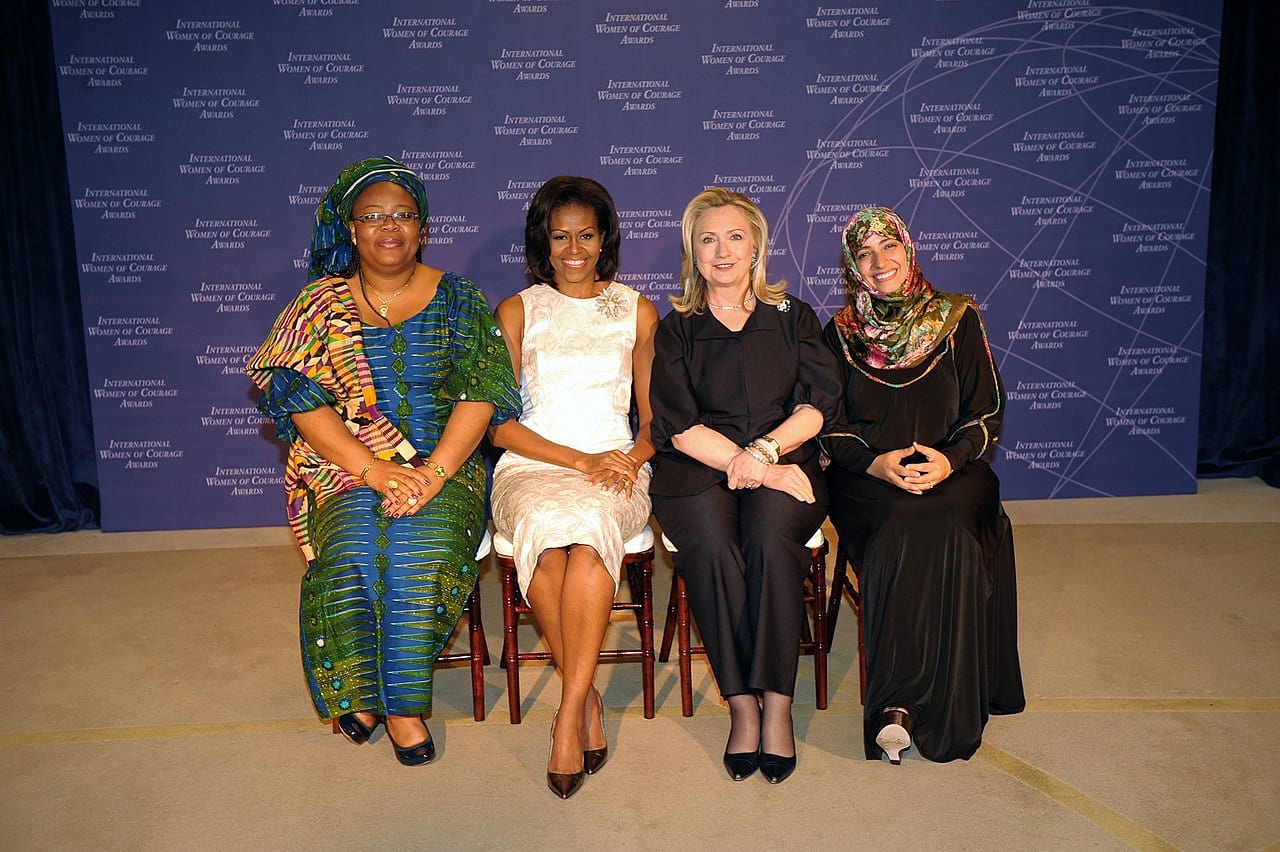Secretary Clinton and First Lady Obama With 2011 Nobel Peace Prize Laureates Leymah Gbowee and Tawakkol Karman. Image credit: United States government work
Despite being the bearers of social progress and nurturers of the family, women have been largely overshadowed in Middle Eastern politics, sidelined by patriarchal norms and cultural mores. However, recent years have seen a change, however gradual.
For most of the 20th century, women in the Middle East faced overwhelming barriers to their political participation. The political scene was exclusively male, with women rarely stepping into the limelight. But there were notable exceptions, such as Yemen’s Tawakkol Karman, the first Arab woman to win the Nobel Peace Prize for her instrumental role in the Arab Spring.
In the 21st century, we’ve seen significant changes. Take the example of the United Arab Emirates, where, as of 2022, women constituted 50% of the Federal National Council. Another beacon of progress is Tunisia, where women hold around 31% of the parliamentary seats, an achievement unparalleled in the Arab world. These women are breaking barriers and reinforcing that a woman’s place can, and should, be in the corridors of power, alongside men.
However, the situation is far from perfect. Despite these commendable advances, several hurdles remain. Deep-rooted social norms, persistent gender bias and restrictive laws still create a daunting landscape for women. Saudi Arabia, for example, only allowed women to drive in 2018 and still requires male guardianship for women to make critical life decisions. In Iran, women can be elected to parliament but cannot run for president.
External factors have added another layer of complexity to the issue. The civil war in Syria, the conflict in Yemen and the Afghan refugee crisis, to name but a few, have pushed the agenda of women’s political rights to the sidelines, seen as a luxury in the face of survival.
The road to gender equality in Middle Eastern politics remains winding and steep, but it’s a journey worth taking. Policies that promote gender equality, such as Jordan’s gender quota system, which reserves a certain number of parliamentary seats for women, need to be introduced and promoted. International agencies and NGOs can provide support, such as UN Women’s political empowerment programmes in Palestine and Iraq. Education, especially for young girls, must be a priority. The example of Malala Yousafzai and her advocacy for girls’ education in Pakistan is a shining beacon of what can be achieved.
Several practical measures could help increase the representation of women in Middle Eastern politics. The public and private sectors could create programmes to mentor and develop future female leaders. These initiatives would provide the necessary skills, resources and networks to break into the political sphere. Governments should also actively promote and enforce gender equality in education, thereby removing one of the main barriers to women’s political participation. At the same time, the media could play a key role by highlighting successful women in politics, thereby challenging stereotypes and providing positive role models. There is also a need to promote local, regional and international partnerships that focus on increasing women’s political representation. This could include collaboration between governments, NGOs, academic institutions and community organisations to share best practices and promote policy change. Finally, the role of men as allies cannot be overemphasised; they should be encouraged to support gender equality initiatives, including in politics, for the benefit of society as a whole.
Increasing women’s participation in politics will have far-reaching effects. It promises a future where women can contribute to decision-making, propose innovative solutions and better represent half the population. We need look no further than the leadership of New Zealand Prime Minister Jacinda Ardern during the COVID-19 pandemic to see the effectiveness of female leadership.
The full participation of women in politics in the Middle East is not something that can be achieved overnight. Although progress has been made, there are still mountains to climb. But with determination, supportive policies and international cooperation, the day will undoubtedly come when women play an equal role in shaping the political destiny of the Middle East. The seeds of change have been sown; now it’s time to nurture them to fruition.



















